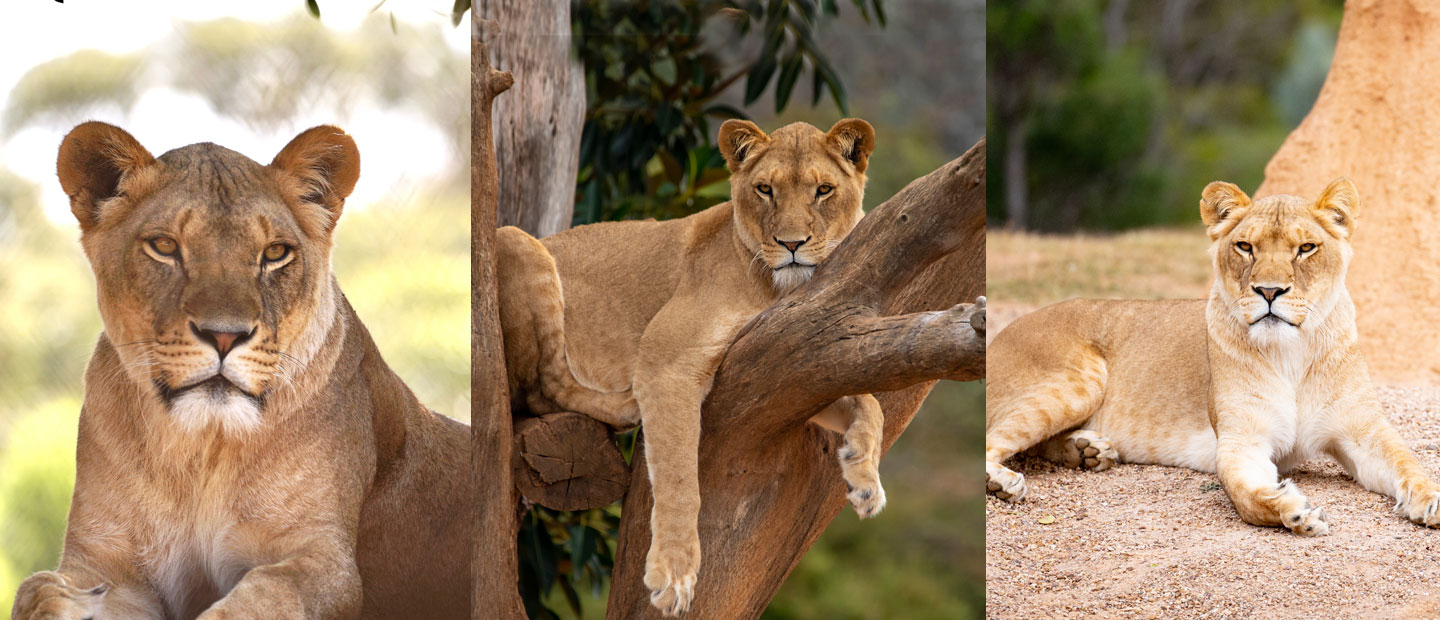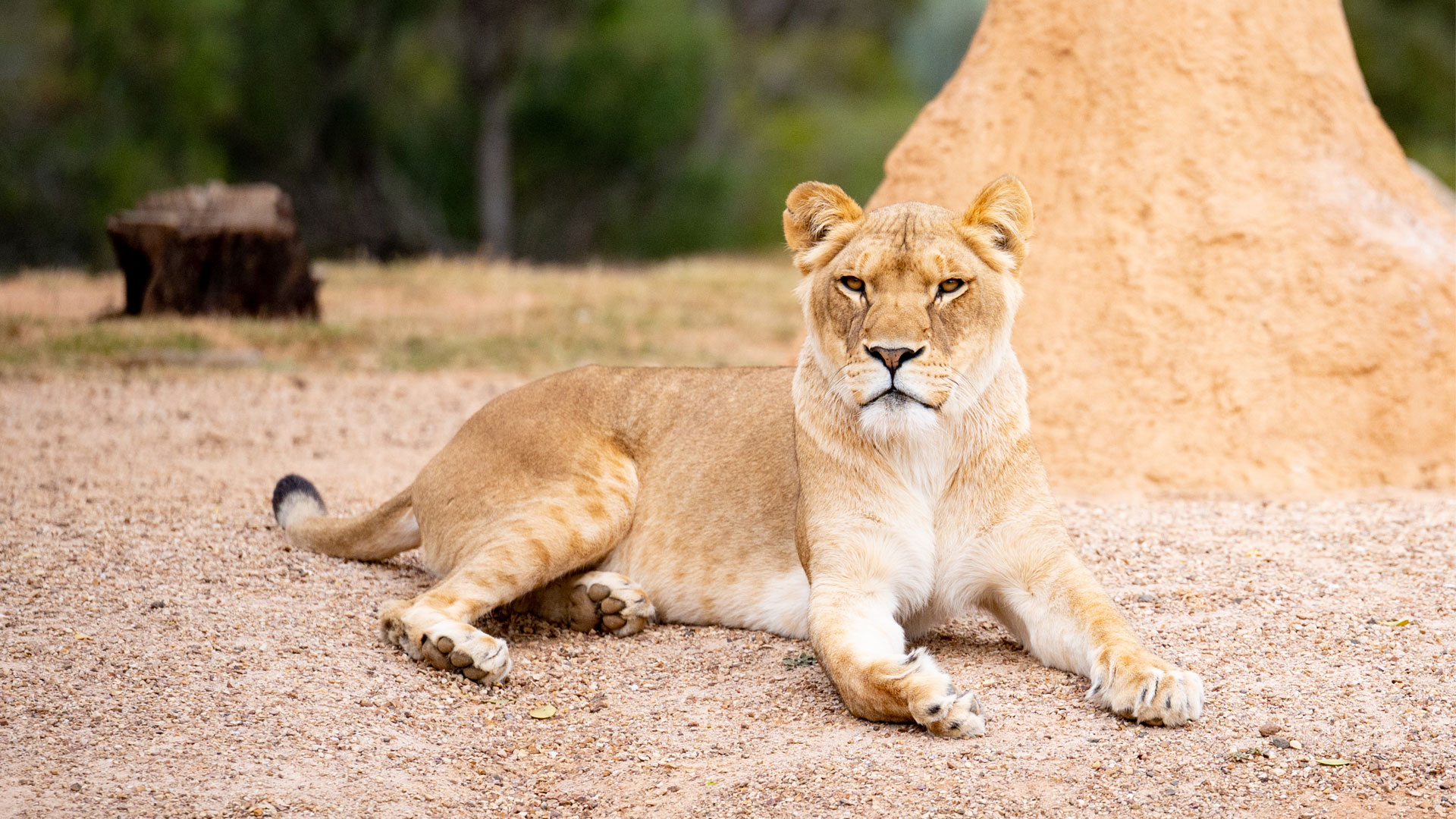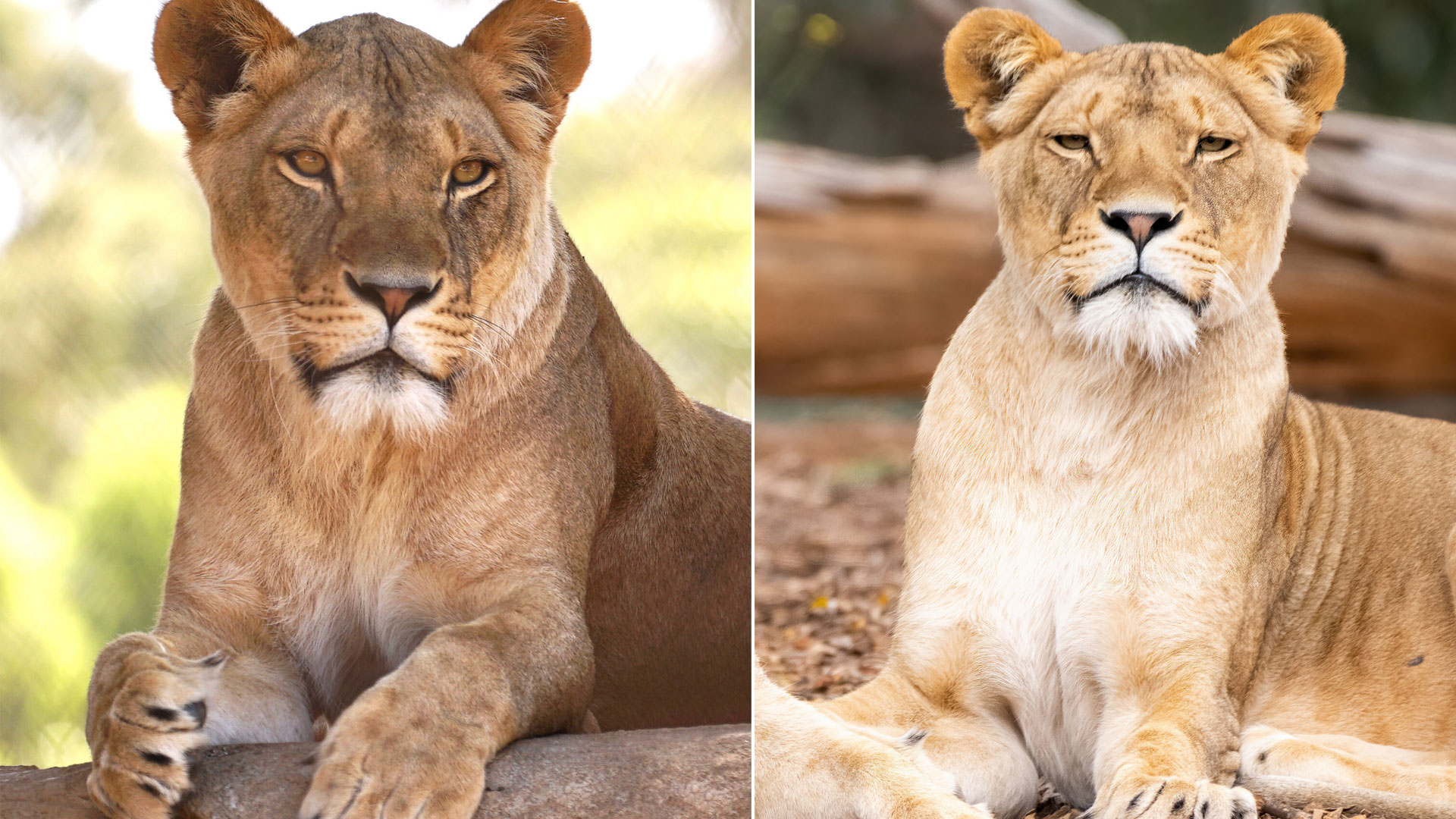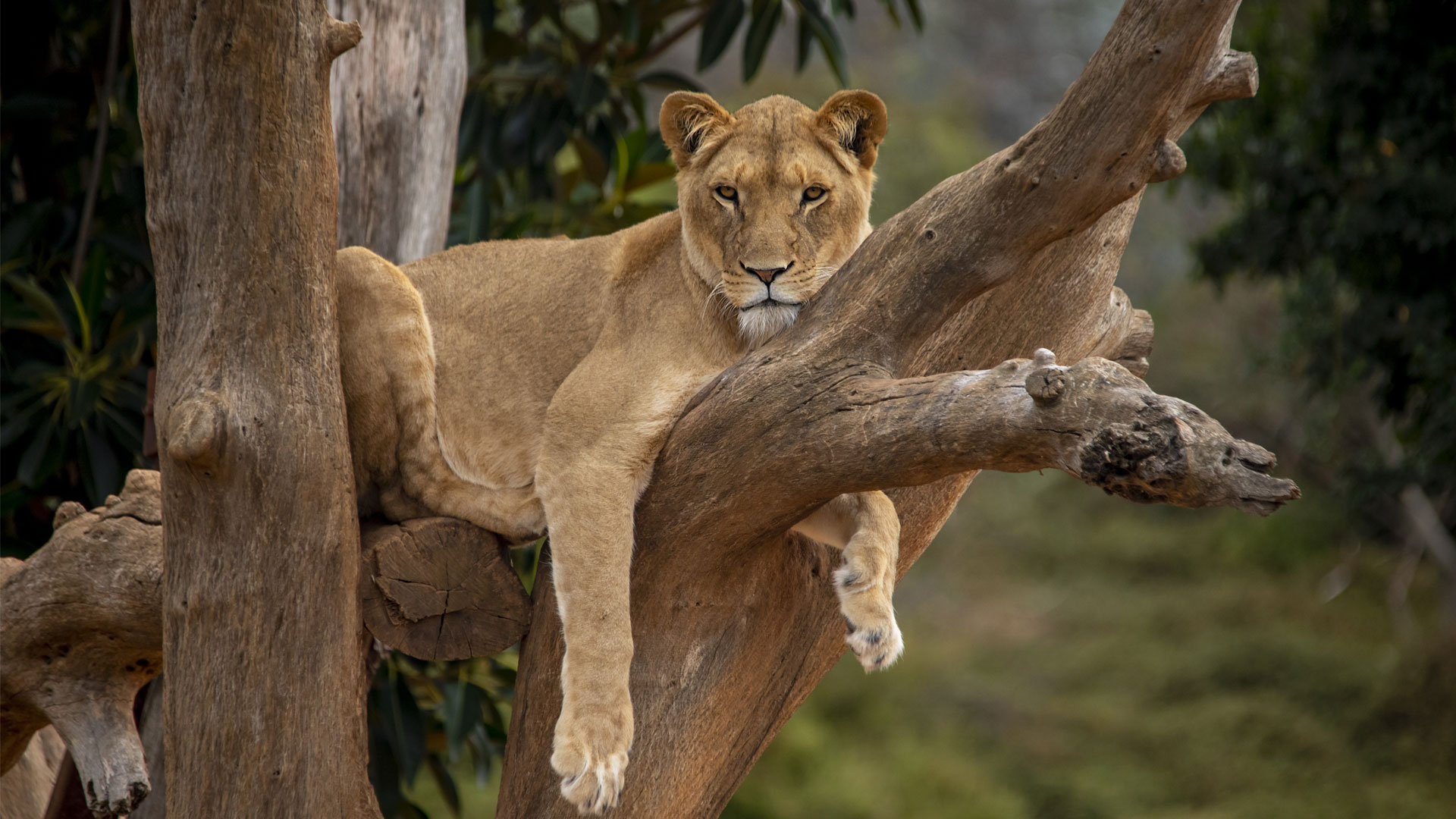Auckland Zoo is excited to share it has welcomed three young female lions from Werribee Open Range Zoo in Australia as part of the international zoo breeding and advocacy programme for this increasingly threatened African big cat.
Twin sisters Aziza and Kibibi, and half-sister Ilola - all aged four years - arrived at Auckland Zoo on Tuesday evening, where they have begun their quarantine, a standard MPI and Auckland Zoo biosecurity requirement for all new animal arrivals. Once completed, the trio will have the full run of their strategically landscaped habitat in the heart of the Zoo’s Africa Safari Track, and enjoy all of the enriching sights, smells, and sounds that come with it!
Auckland Zoo’s Head of Animal Care and Conservation, Richard Gibson, says the highly complex process of planning for the lions’ move began many months ago and includes a great number of people, permits and processes, so it is a huge relief to have been able to progress this important animal transfer.
“While many things are not possible for any of us during these essential Covid lockdowns, there were fortunately no reasons for delaying the long-planned transport of these important big cats. Commercial aircraft and freight companies are still operating. We’ve worked closely with and had the full approvals and support of MPI and the equivalent Australian authorities, and together implemented strict Covid-19 protocols to achieve a very safe, smooth and successful move,” says Gibson.
Werribee Open Range Zoo’s Acting Life Science Manager, Ben Gulli, said the lioness trio’s relocation to Auckland Zoo will help to maintain the important zoos’ breeding programme for the species in the region.
“This international program aims to maintain healthy and genetically viable prides of lions in zoos. This is a key component of protecting the precious species and helps to support the conservation of wild lion populations by raising awareness,” says Mr Gulli.
“Kibibi, Ilola and Aziza have helped to educate the Australian public about the plight of their species, inspiring action to support their wild cousins, and no doubt that will continue across the Tasman as they form a new lion pride at Auckland Zoo.”
Auckland Zoo’s carnivore team leader, Lauren Booth, says she and her team are delighted to have welcomed the trio, who are already settling in well.
“Having three very clever young girls in Aziza, Kibibi and Ilola is both daunting and very exciting for us. We know they’ll have a lot to teach us, and we are really looking forward to getting to know each of them and their unique personalities - and once the Zoo can safely re-open, sharing them with all our visitors.”
“Lions are an incredibly charismatic and iconic species with engaging social dynamics and a simply majestic presence, that we all just can’t help but fall in love with,” says Lauren, who has worked with big cat species for the past 14 years.
Video
Lions Aziza, Kibibi, and Ilola enjoying their kai
Footage taken at Werribee Open Range Zoo
“I feel they’re often thought of as very common, but the sad reality is that African lions (classed as ‘Vulnerable’/IUCN Red List) are now only found across eight percent of their historic range, and their numbers have almost halved over the past 25 years.
“Given this, having lions back at Auckland Zoo is fantastic, as we once again have this great opportunity to connect our community to these big cats and their story, and grow the Zoo’s mission to build a future for wildlife.”
While Tāmaki Makaurau Auckland remains in lockdown and Auckland Zoo is therefore closed to visitors, we continue to bring the Zoo to our communities via our social channels We look forward to keeping everyone updated about how Aziza, Kibibi and Ilola are continuing to settle in, so be sure to check in!
African Lion Fast Facts
- The IUCN Red List of Threatened Species classifies African lions (Panthera leo) as ‘Vulnerable’. Over the past 21 years, the African lion population has decreased by 43% and continues to decrease. Once widespread across the African continent, it is now extinct in North Africa.
- Key threats to lions are human population growth and agricultural expansion – causing loss of habitat for lions, and increasingly, human-animal conflict. Illegal hunting, poaching and poisoning by livestock farmers are also impacting
- On average, lions sleep approximately 20 hours per day
- Female lions are the pride’s primary hunters and leaders.
- Auckland Zoo lions: Auckland Zoo has welcomed three four-year-old lionesses from Werribee Open Range Zoo in Australia as part of zoos’ international breeding and advocacy programme for this big cat species. They are twin sisters Aziza and Kibibi, and half-sister Ilola (pronounced ‘eee-lo-la’)
Q&A's
The incredibly complex process of planning for the lions’ move began many months ago and involved a great number of people, permits and processes. This included contingency planning should Auckland be in lockdown at the time of their move.
With all biosecurity, health, and safety protocols (Covid-19 among them) and approvals in place, there was no reason for our zoos to delay the long-planned transport of these important big cats.
Commercial aircraft and freight companies are still operating. We worked closely with and had the full approvals and support of MPI (Ministry for Primary Industries) and the equivalent Australian authorities, and together implemented strict Covid-19 protocols to achieve a very safe, smooth, and successful move.
Since this was confirmed, Auckland Zoo has been taking extra precautions with both carnivores and primates as both of these groups are susceptible to Covid-19. These measures include the specialist staff caring for them wearing PPE - face masks, gloves, changing footwear – at all times they are in close proximity to these animals, when undertaking animal food preparation, and when cleaning their indoor and outdoor habitats. When Auckland is at Alert Level 3 or 4, we divide the keeper teams into separate ‘bubbles’ to further minimise risk. Our veterinary team continues to stay up to date with the latest Covid-19 research relating to zoo animals and will adapt protocols as/when necessary.
No. We have no reason to suspect these lions have been, or will be, infected with Covid-19 as both Werribee Open Range Zoo and Auckland Zoo routinely practice strict biosecurity (including use of PPE) with the big cats in our care. Strict Covid-19 protective protocols were implemented throughout the transfer.
Standard MPI biosecurity and Auckland Zoo quarantine requires all new animal arrivals to be tested for a range of diseases to ensure a clean bill of health before they leave, and again once they arrive. This involves 30-day isolation periods both sides of the Tasman under intensive and extensive quarantine protocols.
Once Auckland moves to Alert Level 2, Auckland Zoo will be able to safely open. To visit us and see the lions, you’ll be required to book online and adhere to our Alert Level 2 conditions on site. In the meantime, from the safety of your bubbles, we’re continuing to bring Auckland Zoo to you via our social channels and website, and with the help of our keepers (essential workers) will keep you posted about how lions Aziza, Kibibi and Ilola are settling in.
Lions Aziza, Kibibi and Ilola are now in quarantine. This is a standard MPI and Auckland Zoo biosecurity requirement for all new animal arrivals. As soon as they are in their habitat in our Africa Safari Track, we’ll be able to film them, and share with everyone on our social channels, so be sure to check in regularly!
In the meantime, see above to watch some footage of Aziza, Kibibi and Ilola in action at their former home, Werribee Open Range Zoo, thanks to our zoo colleagues there.





